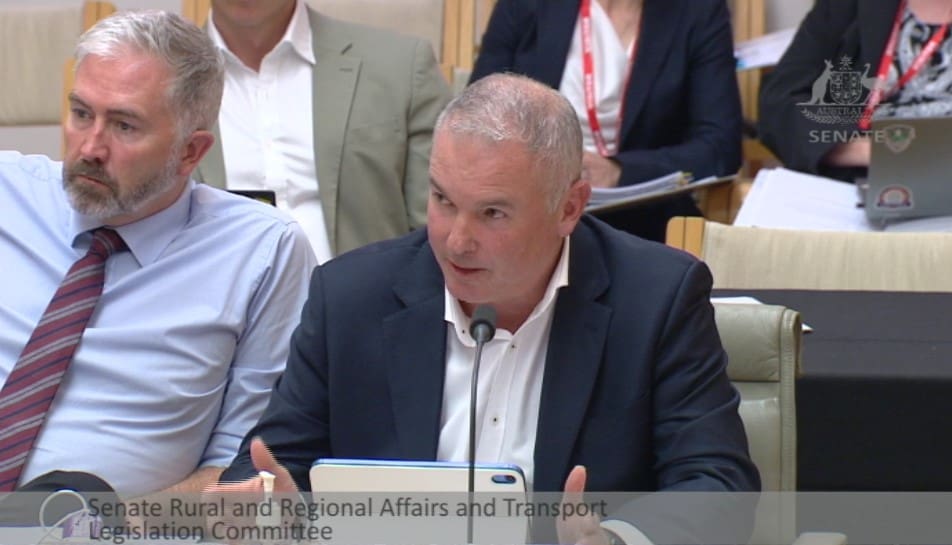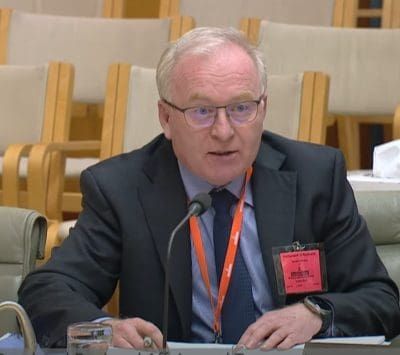
APVMA CEO Scott Hansen speaking at the Rural and Regional Affairs and Transport Committee Senate Estimates hearing this week.
THE AUSTRALIAN Pesticides and Veterinary Medicines Authority has received 168 submissions into its inquiry into paraquat and diquat use after public consultation closed on October 29.
APVMA chief executive officer Scott Hansen told the Rural and Regional Affairs and Transport Committee Senate Estimates hearing this week 29 of those submissions were from doctors and health organisations.
It is unclear where the bulk of the submissions were from; however, many grain-industry and farming bodies have come out in recent months calling for both chemicals to be retained in cropping systems.
Mr Hansen said the APVMA was “working our way through” the submissions, as well as reviewing the “science and data” available.
“We’ll have a look through the 29 submissions we’ve received from doctors and associations and health organisations and see if there’s anything new in amongst that list that we haven’t already been looking at or has had consideration,” Mr Hansen said.
He said a final decision on the review was now expected for “about midway through next year”.
Mr Hansen confirmed the review of paraquat and diquat was initiated by a request from the Federal Government.
“Chemicals will get put on the review list because of a particular concern or issue.”
He said chemicals can be added to the list by the Minister of Agriculture, Fisheries and Forestry, and both are being reviewed after inclusion from the Minister.
Review delays questioned
Greens Senator for Tasmania Peter Whish-Wilson questioned why it took the APVMA more than 25 years to conduct the inquiry, noting an intention by APVMA predecessor the National Registration Authority published in a 1997 gazette to review the use of paraquat.
Mr Hansen said reviews of the chemical were “ongoing” but this was the first “complete one” that took into account all factors, including human health and the environment.
He said there were “at least four different periods of review of paraquat during that period, some of them producing quite detailed assessments”.
Mr Whish-Wilson also queried whether the APVMA was putting a strong enough weight on decisions made by international authorities, some of which have recently banned use of diquat and paraquat.
“The way it looks to me…is that there has been an undue reliance on information submitted in the original applications for active-constituent approvals,” Mr Whish-Wilson said.
Mr Hansen said the APVMA monitored “all international regulators’ decisions and assessments” and compared the usage patterns, dosage rates, and label requirements to Australia before decision whether it changed “the risk profile”.
GRDC response
In a later session, Grains Research and Development Corporation managing director Nigel Hart said the organisation had not “done a specific economic analysis” on the impact of losing paraquat and diquat from the farming system.
He said GRDC’s function was more around considering other options if paraquat and diquat were no longer available to growers.
“A core part of our role is really to explore opportunities to look for potential new molecules that could potentially be brought to market to be able to address any changes that might occur around particular chemicals not being available in the market any longer,” Mr Hart said.
He said GRDC had made a submission to the review, but did not clarify its stance.

GRDC managing director Nigel Hart.
“We’ve made a submission to the APVMA process providing scientific evidence that we produce as part of many of the research programs and studies that we do around farming systems.”
Calls not to rush review
The hearing comes as grain-growing organisations call for the APVMA not to rush its review of diquat and paraquat.
Grain Producers Australia research, development and extension spokesperson Andrew Weidemann said no deadlines should be put on the review by the Federal Government.
“Internal and external pressures on the APVMA have been high in recent times, with costs, resourcing and performance questions being asked in the political sphere and in the media,” Mr Weidemann said.
“While the authority needs to be accountable for its work, it also needs the space to operate effectively without deadlines that do not allow for due diligence.”
In a letter sent to Minister for Agriculture, Fisheries and Forestry Julie Collins, Grain Producers of South Australia chair John Gladigau said the decision should not “be further pressured by unrealistic politically imposed deadlines”.
He also called for the Federal Government to partner with the GRDC to “invest in accelerated research and development efforts to find safe, effective alternatives to paraquat and diquat”.
Grain Central: Get our free news straight to your inbox – Click here

HAVE YOUR SAY